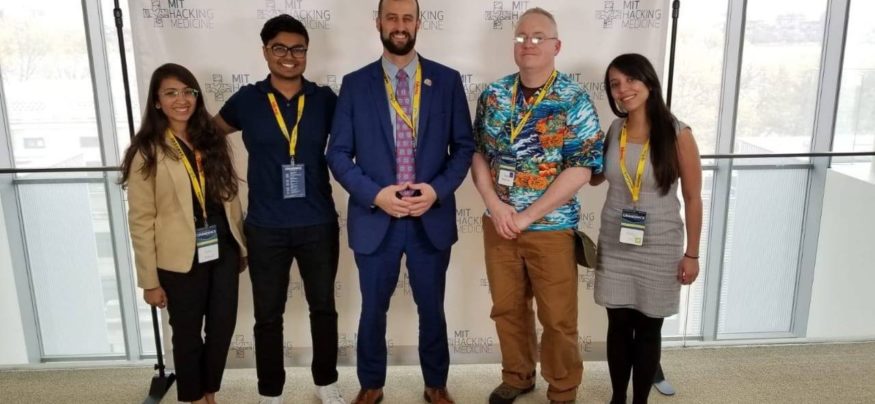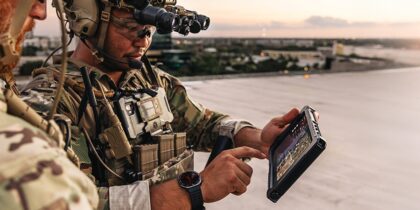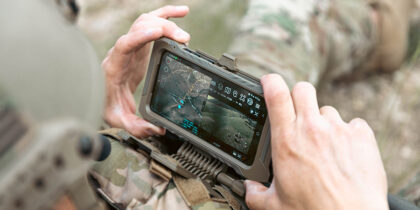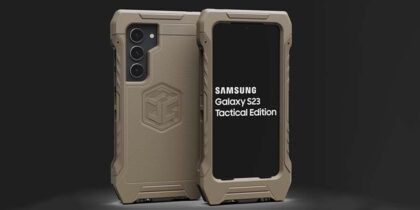More than 20 veterans and service members die from suicide each day, according to Stars and Stripes.
This staggering rate of tragedies compelled Prescott Paulin, a U.S. Marine Corps veteran and former Battelle research and development innovator, to attend the MIT Hacking Medicine Grand Hack 2019 in Cambridge, Massachusetts. He joined forces with Mark Drinkwater, a U.S. Army veteran and Department of Veterans Affairs (VA) provider, and Debora Silva, a data analyst for Blue Cross Blue Shield, to design a solution aimed at tackling one of the Veterans Health Administration (VHA)’s — and our nation’s — toughest challenges: mental health.
The solution they developed, called Match Perch, won a Samsung Breakthroughs That Matter award for being the most effective and transformative digital health solution with the potential to improve access to and quality of care for veterans in its track.
“One of the challenges in creating a solution to address veteran suicide is listening to the needs of someone who is not here to speak,” said Paulin. “Good innovations are fueled by user experience design, which means listening to the people who need your solution and may not even know they need it yet.”
Challenges From an Insider’s View
As a Marine and VA patient, Paulin was able to help his team look at healthcare delivery through the lens of the service member experience. Among the many barriers for ongoing access and preventative treatment that he and his team discussed was a perceived stigma around seeking mental healthcare.
Securing Digital Displays in Government
Learn how security, compliance and collaboration drive digital signage decisions across government agencies. Download Now
“Veterans fail to request mental health treatment for myriad reasons: feeling like your caregiver doesn’t understand your military journey, fear of creating a permanent mark on your medical record where people see you as handicapped, fear that disclosure will destroy your career potential or revoke your security clearance. These factors prevent veterans from pursuing the help they need before they end up at a critical crossroads,” said Paulin. “When a man or woman with mental health issues allows a destructive mindset to permeate their daily routine, it festers until there is a breaking point, prompting a veteran to end their life.”
Making Connections When They’re Needed
To address these care challenges, the team developed the concept of Match Perch, a mobile application that establishes a third-party-administered wellness program for veterans suffering from depression, anxiety and post-traumatic stress disorder (PTSD). Whenever a veteran feels suicidal tendencies or is on the edge — or “perch” — they can launch a video-based crisis intervention application that connects them with a trained and credentialed mental health first responder outside of the VA.
Using the patented Mayday Alarm emergency response platform to facilitate crisis communications, Match Perch assesses a veteran’s preferences to pair patients with like-minded veteran counselors, matching them by age, branch, gender, service campaign and mental health challenge. This customized matching helps veterans better connect with a provider and increases participation in a mental health program, ultimately yielding a better quality of life, fostering a sense of community and camaraderie.
For longer-term care that prioritizes prevention to reduce emphasis on crisis de-escalation, veterans are encouraged to schedule ongoing group therapy sessions — virtually or in person — among peers, plus a trained veteran counselor is added to facilitate a goal-oriented dialogue. When upper-level professional help (psychologist, psychiatrist, etc.) is recommended, the veteran has full control over the disclosure of any information related to their medical chart, which may be required to escalate treatment to higher-tier VA medical professionals in order to initiate a preventative care plan or medication.
Preserving Privacy Removes Stigma, Improves Security
Under the new design of this platform, third party data escrow providers like InterSystems may be leveraged to ensure integrity and security of medical data while transitioning portions of the record on demand to the VA, only following approval from the patient seeking additional treatment options.
“Match Perch removes stigmas around treatment by preventing disclosure to the VA of whether a veteran was volunteering help or receiving help between peers. All that is noted is that someone participated, which allows resources to be committed for the benefit of the group therapy session,” said Silva. Speaking from her experience with Blue Cross Blue Shield, Silva indicated that structuring Match Perch as a wellness program means veterans may benefit from the added aid of private sector insurance where applicable.
On the technical side, the Match Perch team worked through how to tackle one of the VA’s greatest barriers to new technology adoption, which is security. The team solved the data protection problem by integrating Match Perch with Samsung Knox, a defense-grade mobile security platform.
“Building our solution on the Knox platform allowed us to ensure data is captured anonymously, confidentially and securely in a way that meets the VA’s high security standards,” said Paulin. “That means every veteran always has full control over their personal medical data. When they need help at 2 a.m., they can instantly connect to the best responder match in their 911 moment. Because our veteran volunteers may not be in a call center at 2 a.m. to help their fellow service member, Knox allows our volunteers to intake medical information, secure it at rest and then securely transit it back to our data escrow provider after the call is concluded.”
Explore the ways Samsung supports innovations with the potential to transform healthcare delivery for service members, veterans and all citizens.








